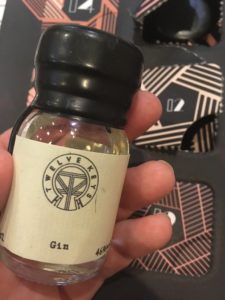 Ramsbury gin are one of the rare distilleries that have control of the whole process, from field to table. They grown their own wheat on their estate in Wiltshire and use their own chalk filtered water source. Sustainability is key – the heating in the distillery is generated by a biomass boiler, the livestock feed on the leftover wheat, and they clean their waste water with a reed bed system that is wildlife friendly. Before making gin, they started life as a brewery and used this knowledge to help make their gin what it is. They start by making their own vodka, which they then distil with nine botanicals (the usual suspects alongside some fresh quince) to make a gin they say is fruity and sweet with a floral note. So, is that really the case?
Ramsbury gin are one of the rare distilleries that have control of the whole process, from field to table. They grown their own wheat on their estate in Wiltshire and use their own chalk filtered water source. Sustainability is key – the heating in the distillery is generated by a biomass boiler, the livestock feed on the leftover wheat, and they clean their waste water with a reed bed system that is wildlife friendly. Before making gin, they started life as a brewery and used this knowledge to help make their gin what it is. They start by making their own vodka, which they then distil with nine botanicals (the usual suspects alongside some fresh quince) to make a gin they say is fruity and sweet with a floral note. So, is that really the case?
review
Ginvent 2018 – Dartmouth English Gin
 Today’s gin is one of the newer gins to the market as they only launched this year. Dartmouth English gin comes from the depths of Devon, using spring water from Calancombe alongside fresh herbs, flowers and fruit from the estate there. Their list of botanicals sounds like a good mix – juniper blended with floral notes (lavender, rosemary and some citrus) followed by warming spices (grains of paradise, cardamom and cubeb berries). Despite only launching this year, they have already been awarded “Gin of the Year 2018” by the Craft Distilling Expo from over 600 entrants from around Europe.
Today’s gin is one of the newer gins to the market as they only launched this year. Dartmouth English gin comes from the depths of Devon, using spring water from Calancombe alongside fresh herbs, flowers and fruit from the estate there. Their list of botanicals sounds like a good mix – juniper blended with floral notes (lavender, rosemary and some citrus) followed by warming spices (grains of paradise, cardamom and cubeb berries). Despite only launching this year, they have already been awarded “Gin of the Year 2018” by the Craft Distilling Expo from over 600 entrants from around Europe.
Ginvent 2018 – 209 Gin
 If you saw a full size bottle of 209 gin you’d recognise it instantly. One of the first craft gins on the scene, they launched in 2005 from San Francisco and are available in most supermarkets. They’ve since gone on to release an interesting range of gins – three of them are barrel aged in wine casks, giving them a sauvignon blanc, a chardonnay and a cabernet sauvignon. They also have a gin and vodka which are Kosher-for-Passover – one of the only spirits in the world overseen by The Orthodox Union to ensure the entire process meets the kosher dietary law. Their flagship gin differs to the norm, thanks to American definitions on gin theirs is less focused on juniper, and features citrus and floral notes with a touch of spice.
If you saw a full size bottle of 209 gin you’d recognise it instantly. One of the first craft gins on the scene, they launched in 2005 from San Francisco and are available in most supermarkets. They’ve since gone on to release an interesting range of gins – three of them are barrel aged in wine casks, giving them a sauvignon blanc, a chardonnay and a cabernet sauvignon. They also have a gin and vodka which are Kosher-for-Passover – one of the only spirits in the world overseen by The Orthodox Union to ensure the entire process meets the kosher dietary law. Their flagship gin differs to the norm, thanks to American definitions on gin theirs is less focused on juniper, and features citrus and floral notes with a touch of spice.
Ginvent 2018 – Faith & Sons Mango Gin
 I’m starting this with a bold statement: today’s gin will either be disgusting, or delicious. I don’t think there’s going to be an in between. Why? Today we try Faith & Sons mango gin. I like mango. I like gin. But I am not sure if I want the two together. Faith & Sons puree their organic mangoes which are then added to their (also organic) spirit, meaning they use no artificial flavours or colours. Regardless of the flavour, I am massively in love with the Manchester based distillery’s labels and square bottles. So, do we love it or loathe it?
I’m starting this with a bold statement: today’s gin will either be disgusting, or delicious. I don’t think there’s going to be an in between. Why? Today we try Faith & Sons mango gin. I like mango. I like gin. But I am not sure if I want the two together. Faith & Sons puree their organic mangoes which are then added to their (also organic) spirit, meaning they use no artificial flavours or colours. Regardless of the flavour, I am massively in love with the Manchester based distillery’s labels and square bottles. So, do we love it or loathe it?
Ginvent 2018 – Hayman’s Royal Dock gin
 Hayman’s make good gin. Blanket statement. I hope. I’ve tried their London Dry, Sloe and Old Tom gins, and today we try their Royal Dock. This is bottled at 57% ABV, traditional for Navy Strength gin and they still use the same recipe that was used in 1863 when they supplied the gin to the English Admiralty. The higher ABV allows the juniper to shine through, accompanied by notes of citrus, coriander and a hint of subtle spice.
Hayman’s make good gin. Blanket statement. I hope. I’ve tried their London Dry, Sloe and Old Tom gins, and today we try their Royal Dock. This is bottled at 57% ABV, traditional for Navy Strength gin and they still use the same recipe that was used in 1863 when they supplied the gin to the English Admiralty. The higher ABV allows the juniper to shine through, accompanied by notes of citrus, coriander and a hint of subtle spice.
Ginvent 2018 – Tappers Darkside gin
 It’s day 14 of Ginvent and today we are drinking Tappers Darkside gin. Tappers have been making gin since 2016 in their home of West Kirby, t’up norf near Chester and Liverpool. This is certainly a small batch gin, every batch they make is a total of 40 bottles, each of which is hand filled, labelled, waxed and numbered. It took them a year to develop the recipe, based on Prohibition Era compound style gins. Darkside gin reflects the mix of seaside botanicals from the area: red clover flowers, chickweed and sea beet alongside five other botanicals (they don’t say that these are, but I’m guessing juniper, angelica and orris root are probably in there somewhere because they always are).
It’s day 14 of Ginvent and today we are drinking Tappers Darkside gin. Tappers have been making gin since 2016 in their home of West Kirby, t’up norf near Chester and Liverpool. This is certainly a small batch gin, every batch they make is a total of 40 bottles, each of which is hand filled, labelled, waxed and numbered. It took them a year to develop the recipe, based on Prohibition Era compound style gins. Darkside gin reflects the mix of seaside botanicals from the area: red clover flowers, chickweed and sea beet alongside five other botanicals (they don’t say that these are, but I’m guessing juniper, angelica and orris root are probably in there somewhere because they always are).
Ginvent 2018 – An Dúlamán Gin
 Today is lucky number 13 of Ginvent and today we are trying a gin I only heard of recently, with a cracking bottle design. An Dúlamán Gin comes from County Donegal in Ireland, Sliabh Liag Distillery is the first distillery from Donegal for over 175 years and their main botanical is local seaweed. Five types of seaweed to be precise. This ties into the brand via the name – Dúlamán comes from an Irish folk song about a conversation between two seaweed collectors. Basically. They REALLY like seaweed over there.
Today is lucky number 13 of Ginvent and today we are trying a gin I only heard of recently, with a cracking bottle design. An Dúlamán Gin comes from County Donegal in Ireland, Sliabh Liag Distillery is the first distillery from Donegal for over 175 years and their main botanical is local seaweed. Five types of seaweed to be precise. This ties into the brand via the name – Dúlamán comes from an Irish folk song about a conversation between two seaweed collectors. Basically. They REALLY like seaweed over there.
Ginvent 2018 – Twelve Keys gin
 Happy 12 December! Fittingly, today’s gin is Twelve Keys. Which is fantastic. How do I know this? Well, I’ve already tried it after I met them at Junipalooza and you can read what I thought over here.
Happy 12 December! Fittingly, today’s gin is Twelve Keys. Which is fantastic. How do I know this? Well, I’ve already tried it after I met them at Junipalooza and you can read what I thought over here.
You can buy a 70cl bottle of 46% Twelve Keys gin from Gin Kiosk for £39.90 (at time of writing). You can find Twelve Keys on Facebook, Twitter and Instagram.
Have you tried Twelve Keys gin? Let me know your thoughts on Twitter and Instagram. Don’t forget to keep up with all things Ginvent here.
Ginvent 2018 – Corner 53 Cherokee Gin
 I am excited for today. During Gin Foundry’s summer series, we had an evening with Corner 53 who were a bunch of lovely guys that made some great gin so I am looking forward to revisit this. My favourite that evening was their viking strength gin (and by favourite I mean we drank a lot of it and I hated my life the next day). Today however we are drinking their Cherokee gin which is inspired by famous bourbon Jack Daniels. Unable to replicate their maple-charcoal filtration process, instead the team add maple syrup to their list of botanicals and balance the sweetness this brings with sarsaparilla (an earthy vanilla note).
I am excited for today. During Gin Foundry’s summer series, we had an evening with Corner 53 who were a bunch of lovely guys that made some great gin so I am looking forward to revisit this. My favourite that evening was their viking strength gin (and by favourite I mean we drank a lot of it and I hated my life the next day). Today however we are drinking their Cherokee gin which is inspired by famous bourbon Jack Daniels. Unable to replicate their maple-charcoal filtration process, instead the team add maple syrup to their list of botanicals and balance the sweetness this brings with sarsaparilla (an earthy vanilla note).
Ginvent 2018 – Campfire Navy Strength gin
 Last year we were able to try Puddingstone Distillery‘s Campfire London Dry gin, and today we have another Navy Strength gin. Their Navy Strength uses the same botanicals as their London Dry including roasted hazelnuts, golden berries and rooibos tea, but with a small tweak to increase the juniper profile. The ABV is also increased from 42% to 57% which is quite the leap, yet Puddingstone say that it is still smooth and easy to drink. Let’s put that to the test shall we?
Last year we were able to try Puddingstone Distillery‘s Campfire London Dry gin, and today we have another Navy Strength gin. Their Navy Strength uses the same botanicals as their London Dry including roasted hazelnuts, golden berries and rooibos tea, but with a small tweak to increase the juniper profile. The ABV is also increased from 42% to 57% which is quite the leap, yet Puddingstone say that it is still smooth and easy to drink. Let’s put that to the test shall we?